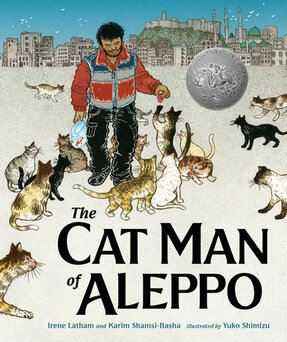By Amina Chaudhri and Courtney Shimek on behalf of The Biography Clearinghouse  The Cat Man of Aleppo is not your typical biography. Its subject, Mohammed Alaa Aljaleel, is an ambulance driver who lives in Aleppo, Syria, where he runs a sanctuary originally established as a cat sanctuary but that has since expanded to include an orphanage. Amid the destruction of the civil war that has been raging for over a decade, Alaa’s sanctuary is a place of peace and hope. This book is a tribute to his work, and a reminder to all of us that we have a responsibility to all living things and that individual acts of compassion can be infectious, leading to collective acts of compassion. Brought to life by Yuko Shimizu’s stunning, intricate illustrations, the city of Aleppo is almost as much a character as the people in The Cat Man. In this month’s Biography Clearinghouse entry, we feature an interview with the book’s creators: Irene Latham, Karim Shamsi-Basha, and Yuko Shimizu. We also explore teaching and learning possibilities that invite readers to learn about the process of research in writing and art, about the effects of war across time and place, and about ways to analyze the illustrations and use them as mentors for new creative projects. Below is an excerpt of the teaching ideas in the Biography Clearinghouse entry for The Cat Man of Aleppo. Researching Visuals In her illustrator’s note, Yuko Shimizu provides readers with a list of references she used to conduct research about the visual images of Syria she created for readers. She spoke of this challenge in her interview with us, and of how this challenge was exacerbated by her being a cultural outsider who had never visited Syria. So much of our research focus with students revolves around writing, but conducting visual research to depict a place as accurately as Yuko did is a challenging skill that requires keen observation skills and strong attention to detail. Begin engaging in this work with students by discussing different elements of visual literacy. As a class, read the first half of Molly Bang’s Picture This: How Pictures Work. Given the visual nature of this book, sharing it using a document camera or leaving it available for students to explore after you read it with them is paramount. Discuss how color, shape, line, scale, texture, motion, etc. change your perception as a reader of visual images. Focus on sections such as the ones on pages 17-19 that depict Little Red Ridinghood as a small red triangle, and how the placement of that triangle on the page shapes how we perceive her vulnerability in the woods. Then select spreads in The Cat Man of Aleppo that similarly make use of composition to evoke our emotions. Some examples include the two-page spread of Alaa and the children surrounded by cats, the spread that follows immediately in which Alaa is surrounded by social media symbols, and the front and back matter spread that depicts a blue sky and white doves.
To see more classroom possibilities and helpful resources connected to The Cat Man of Aleppo, visit the Biography Clearinghouse. Additionally, we’d love to hear how the interview and these ideas inspired you. Email us at [email protected] with your connections, creations, questions, or comment below if you’re reading this on Twitter or Facebook. Amina Chaudhri is an associate professor at Northeastern Illinois University in Chicago, where she teaches courses in children's literature, literacy, and social studies. She is a reviewer for Booklist and a former committee member of NCTE's Orbis Pictus Award for Outstanding Nonfiction for Children. Courtney Shimek is a former Preschool teacher and an assistant professor at West Virginia University in the Department of Curriculum and Instruction/Literacy Studies. Her research interests include young readers’ approaches to nonfiction picturebooks, the convergence between literacy and play, and teacher education. Comments are closed.
|
Authors:
|
CLA
About CLA
|
Journal of Children's Literature
Write for JCL
|
ResourcesCLA-sponsored NCTE Position Statements
|
Members-Only Content
CLA Video Library
|
© COPYRIGHT 2018.
ALL RIGHTS RESERVED |

 RSS Feed
RSS Feed